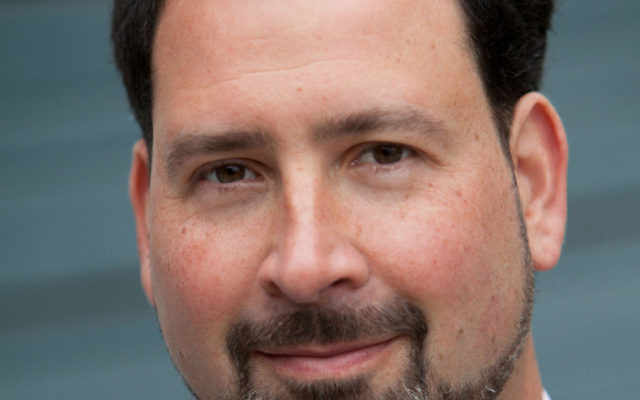Entrepreneurial Rabbi Arrives at Emanu-El
By Michael Jacobs / mjacobs@atljewishtimes.com
When Rabbi Spike Anderson arrived on the pulpit at the Stephen Wise Temple in Los Angeles in 2008, he wanted a noncontroversial topic for his first sermon.
He chose the environment — and watched some of his new congregants walk out in anger.
“After getting over the shock, I was really interested in what their rationale was for their thoughts and opinions. … These are not, you know, bumpkins. These are very educated and very well-spoken people, so over time I sat down with them,” said Rabbi Anderson, 43, who became the new senior rabbi at Temple Emanu-El on July 1.
“In the end we found more common ground over the course of years than separate issues,” he added.
That lesson in dealing with congregants was one of many Rabbi Anderson learned during seven years at Wise Temple, which has 2,300 member families and five rabbis, providing him multiple mentors.
He likened his time at the L.A. Reform congregation to working for IBM and his move to the Atlanta area, where he has no family, and to Emanu-El, “a smaller place with tremendous history, potential and opportunity,” to venturing out with a Silicon Valley startup.
Rabbi Anderson should know: He spent his pre-rabbinical career in the high-tech industry, first with a New York-based headhunting firm that sent him to Silicon Valley to set up a satellite office, then with a business he and two partners launched there in 1997, Monday Technology Solutions.
His strong support for Israel, which later helped him win over Wise Temple skeptics of his progressive positions on social issues, helped end his high-tech career and set him on a path to the rabbinate.
A couple of years on the cusp of the Second Intifada, “Israel was getting its name dragged through the San Francisco media mud in this sort of Orwellian way that one often sees, and I got really angry,” Rabbi Anderson said. He connected with AIPAC and with rabbis in the Bay Area after having put serious Judaism on hold, and soon he was spending 90 percent of his time on pro-Israel activities and Torah study instead of running the business.
He wound up selling his share of the business and spending a couple of weeks sailing and soul-searching. He said he had a revelation on the sailboat. “On my deathbed I didn’t want to have just done more business when I could have done something else. And I had this vision that I would do something that was for Israel and help the Jewish people and selfishly allow me to focus on my own relationship with G-d.”
That was at least the third time Israel helped alter the course of his life.
The first was a trip from his native Boston after his bar mitzvah celebration. Rabbi Anderson said that visit sparked his interest in Judaism after a nonreligious childhood.
He returned to Israel for a semester during his junior year in college, and he delved into serious Torah study with Orthodox rabbis. That experience led to three-year period when he was shomer Shabbos while living in New York.
“These were brilliant teachers who really could bring out the beauty and the divinity of the text and the tradition,” the rabbi said.
Another key teacher was Rabbi Ron Friedman, his childhood rabbi at Temple Israel in Boston. He called Rabbi Friedman after his sailboat soul-searching. The two men didn’t know each other well, but their phone conversations led to an invitation to spend the summer in Boston shadowing Rabbi Friedman.
One day started with a crowded funeral for a young mother, progressed through marriage counseling, pre-marriage counseling and bar mitzvah tutoring, and concluded with a social action project for the homeless that involved hundreds of congregants.
“I remember walking to his car at 10 o’clock at night,” Rabbi Anderson said, “and I said to him, ‘So this is a pretty good job, right?’ And he’s like, ‘It’s the best. Incredibly taxing but incredibly meaningful.’ And it was pretty much at that moment that I decided, ‘Yeah, I’m gonna do it.’ ”
Now he and wife Marita and their two sons and a daughter, ages 9, 6 and 3, are here, drawn to Atlanta by what Rabbi Anderson sees as energy similar to Silicon Valley in the 1990s and attracted to Emanu-El by the opportunity to be an entrepreneurial spiritual leader.
“I have this really interesting skill set of rabbi and all that comes with that, plus I understand business and how to start a business,” he said. “Not just business, but recruiting. The recruiting mentality is very different than just how to read a spreadsheet and sell widgets. It’s a good time to have those skill sets.”




comments